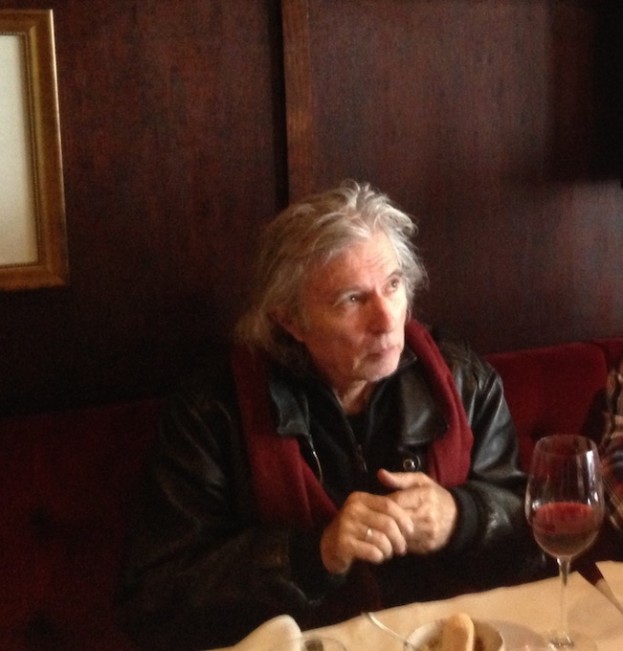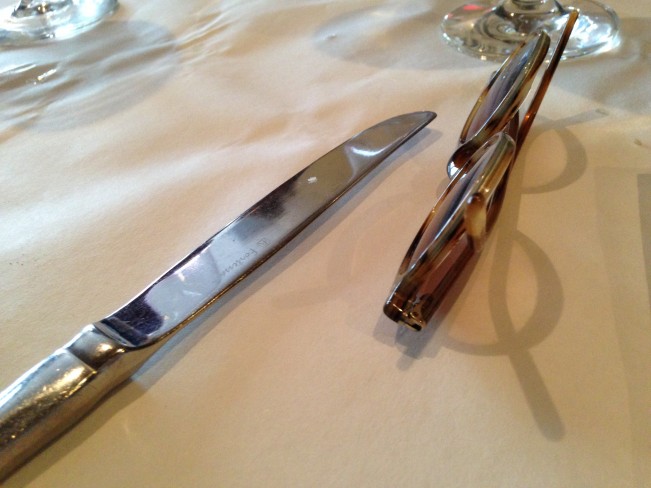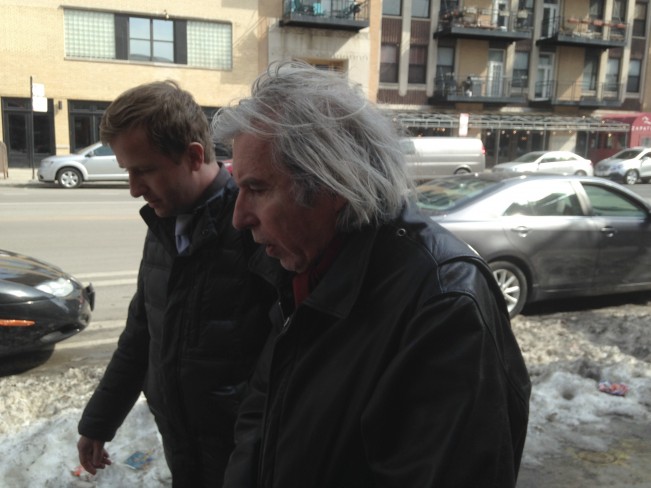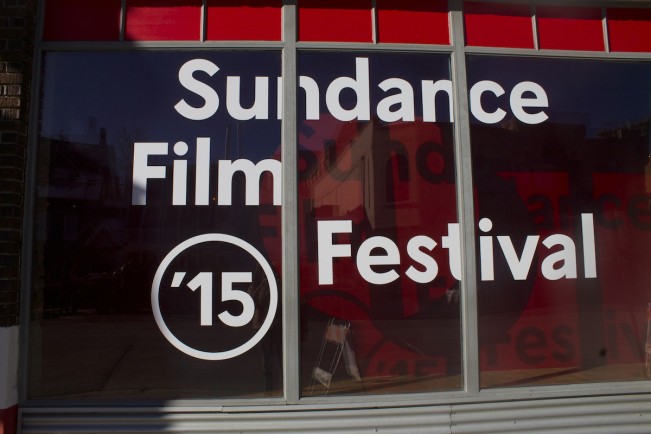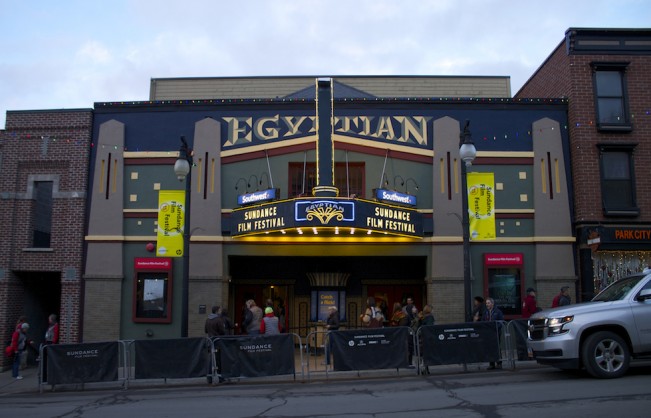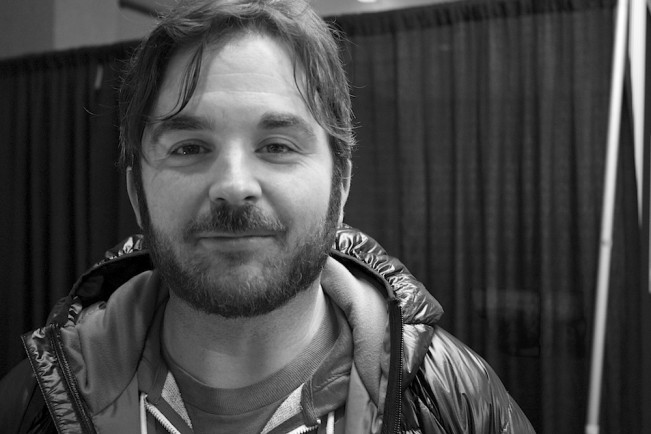Movie City Indie Archive for March, 2015
Errol Morris On GATES OF HEAVEN And Nonfiction Filmmaking (3’08”)
PORTLAND, by Nick Cave, Directed by Iain Forsyth and Jane Pollard.
Joshua Oppenheimer and Dana Stevens’ “Based on a True Story Panel” (90 minutes)
People who would have us believe that the masterpieces of direct cinema, and to be sure, there are masterpieces of direct cinema, but people would ask us to believe that if the camera is there long enough, the mother and the child will forget that the camera crew will behave as though it’s not there. That’s absurd. That’s just idiocy. No one forgets the presence of the camera, no matter how long it’s there. All documentaries are performance. They are performance precisely where people are playing themselves. [Via.]
Lunch with Jacques Doillon, Chicago
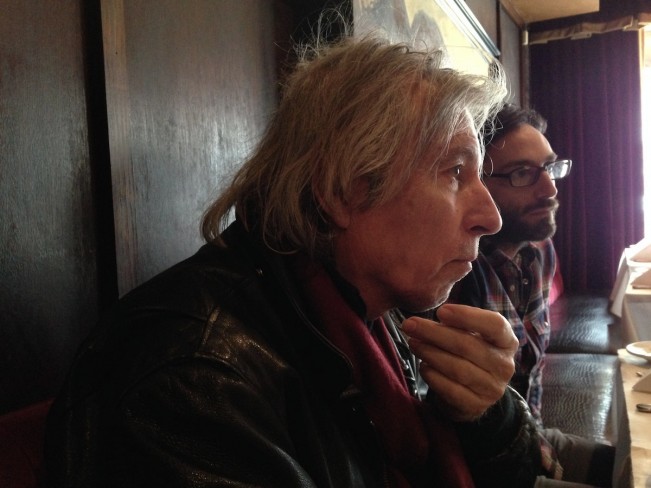
An informal lunch with the charming if melancholic-in-the-moment French filmmaker Jacques Doillon, with critic Ben Sachs, courtesy of the French consulate, the day after Doc Films’ presentation of his as-yet-undistributed in the U. S. Love Battles. His post-screening Q&A had run over an hour. “I had no sleep the night before. I have no idea what I was saying. I hope I was bright and amusing.”
Doillon pours his ice-cube-heavy water into the red wine in front of him. The table wine when he was growing up was usually so terrible, he got into the habit of adding water ever since. He says his more proletarian background does not match the bourgeoisie origins of much of the Nouvelle Vague. “Marguerite Duras was unclassifiable, you cannot just describe her as that kind of writer. I am for Stendhal, not the Nouveau Roman. I am a reactionary cineaste! I find no poetry in the abyss.”
“There are French filmmakers who matter, who matter to me besides my own films? Pialat, Eustache, Duras, Garrel. Garrel and I have been friends for, I don’t know, thirty years? I acted in one of his films, but I never saw it, I was afraid. I never wanted to act. I don’t want to mess up other peoples’ films, but I’m not concerned about my own. The first half hour of Maman et la Putain, I think the acting is not very good, but after three-and-a-half hours, there is only magnificence. I only met Eustache a few times. I don’t watch new movies much anymore. My learning is past. And I don’t live in Paris, I live in Normandy. The theaters show movies just like the ones you can see on television. A new generation can’t tell the difference.”
Doillon has hoped to mount a new film for months now, but he says the system no longer works for a filmmaker like himself, the “cultural exception” applies to films that fit a slot on television, not the work of an auteur. The dance of money between producers, distributors and actors stymies his efforts at the age of 70.
“None of the new cineastes know Mizoguchi! I have affinities for filmmakers west and east and north, the French, we worked in our own corners.”
Then Jacques Doillon leans over, says, “Let me tell you how I met Pialat…” A pause. “Entre nous…” and he continues…
All images © 2015 Ray Pride
Sundance Seen Part 2: The Cooled Take

SUNDANCE 2015, I TOLD MYSELF, would be a festival of no quick takes, a fistful of tweets, lots of movies, interviews, conversations, unforeseen run-ins and path-crossings, hundreds of photographs, and a few more movies if line-ups allowed. A noble experiment. Time to consider, reflect. Of course, afterwards, I was quickly reminded that there’s good reason for buckling down in the midst of all the sensory input of a film festival and churning copy and burning digital files. What happens once you’re back on the ground? Sure, plant your ass in the chair and type–type–type until all is tidy and done. But not so fast. In my passage from the end of January to the early weeks of February, I was first stranded a few days in Salt Lake City because there were no flights back to blizzard-struck Chicago, then once I could return home to zero-degree temperatures, I discovered that the gas company was unable to restore service to my apartment after an errant snowplow had hit-and-run fixtures on the front of the building. Only the beginning: other daily website and weekly reviewing deadlines pounced as I came down with a local strain of not-quite-the-flu, certainly-the-blahs. Then a couple other melodramatic crises rippled to the churning surface, ones that might sing in a brightly-translated European novella but would come off here only as indulgent, finessed confession.
Was it really so long ago that festival coverage took weeks or even months to arrive in the pages of newsprint trades like Variety and august, now yellowed editions of Film Comment? (Decades.) Things have changed immensely in the past decade, even the past ten minutes.
So what does Sundance 2015 look like from the distance of weeks, after other correspondents have already also filed copy from Berlin and True/False, and imminently, SXSW? The notebook is open; the photographs are in a folder on the desktop, what sticks in memory? The pictures jog more than the notes in the dark about twenty-two, twenty-five, however many movies in ten rapid-fire days.
[“Sundance Seen: Part 1” here.]
All images © 2015 Ray Pride; All Rights Reserved.
After a second screening of The End Of The Tour, James Ponsoldt‘s off to see The Witch.
Chai Jing’s Gov’t-Disappeared Pollution Doc, “Under the Dome–Investigating China’s Smog” (103m)
Barbara Kopple Presents To Al Maysles at DOC NYC 2014 (5’14”)
Sympathy for the Documentarian: A 2000 Interview With Al Maysles
YOU CAN’T ALWAYS SEE WHAT YOU GOT.
Thirty years after its coming as a bookend to both the optimism of the 1960s and the school of American cinema verite, David Maysles, Albert Maysles and Charlotte Zwerin’s 1970 Gimme Shelter has been restored and reissued, both on screen as a Criterion Collection DVD.
Gimme Shelter. Gee, whiz. What can be said about this movie? The Stones are on tour, and a free concert in the San Francisco area is shifted to the Altamont Speedway at the last hour; crowds crowd, Hells Angels cause as prevent as much ruckus, a man dies before the camera’s lens. The Stones, notably a taciturn Mick Jagger, observe the footage at some point in the future/present. We return to the past/present: figures scurry into the night, across smoky backlit hillsides as if escaping the primitive past. “Gimme Shelter” is an exemplar of documentary opening its eyes to life, succinctly and tellingly ordered, as the stuff of drama. But it does not tell you what you should think, pronouncing what the material you are regarding means. It’s all a matter of letting the mix of music, Jagger charisma and terrible menace speak quietly, yet stereophonically, for itself. Godard called Maysles the best American cameraman, and there are moments in this brilliantly edited masterpiece that takes the breath away: an amoral eye, greedy only for a picture of life.
This is rock, this is dread, this is sex and longing, and Gimme Shelter is an exquisite microcosm of ambiguity in an observer’s art. I dare you to put half a dozen people in a room and get them to agree on any aspect of Gimme Shelter but its essential excellence. Here are a few words from surviving Maysles brother, Albert. At 73, he has multiple projects in play, including a portraits of contemporary filmmakers for the Independent Film Channel. We talked to him over dinner, then a formal interview the day after the he revisited the picture at the Chicago International Film Festival.
“Did I tell you the story of my experience with Fidel?” the generous, avuncular raconteur begins. Yes, but tell us again. “In 1960, I spent a lot of time with Fidel and with Che, also. I was making a film that ended up being called Yanqui No! One day, Fidel mentioned that he was going to the Chinese Embassy for a party, did I want to come along? I said, ‘Sure.’ So I’m with him at the Chinese Embassy, standing shoulder to shoulder, I don’t have my camera because I couldn’t just walk in with it on my shoulder, I would need someone to do sound. A messenger comes rushing in, hands a telegram. He opens it. As he’s opening it, reading it, knowing that I don’t speak or read Spanish, he turns to me, and says, ‘Shall I translate it for you.’ I say, ‘Please do.’ Just inches away from me, he tells me, ‘The State Department has just broken off relations with Cuba!'”
Maysles smiles. “I have some plans to go back to Cuba. This time, I’ll have my little video camera.” He holds up his palm to show the camera’s scale. “If I’m at the Chinese Embassy, the Romanian embassy, wherever it is, I’ll have that little camera ready when he reads the telegram which he’ll translate, saying, ‘The American State Department has restored relations with Cuba’! I missed the first one because of the movie camera. I’ll get the second one because of my video camera!”
As with the myriad details of the Altamont Speedway crowd in Gimme Shelter, Maysles loves discerning details afterward in the miles of footage video allows you to burn through. “There are things you noticed at the time, but later, things you didn’t think were that important then, are on tape, you can use it.”
Maysles also esteems video’s portability. “There’s no reason not to shoot with today’s equipment. For an hour of tape, it costs only about ten dollars, but on film, on 16mm, not even 35mm, it would be thousands of dollars. Thousands of dollars for an hour, ten dollars for a tape. A little cassette. For a day’s shooting, you can carry the tapes in your pocket.”
Maysles says that video’s affordability as a recording medium leaves the documentary maker no excuse not to shoot, and to shoot promiscuously, with today’s equipment. “The tape for an hour run only ten dollars. A little cassette. For a day’s shooting, you can carry the tapes in your pocket.”
So you can find the authentic moment accidentally? Let God offer you the world? “Y’know, actually, in the case of the documentary filmmaker, God is reality,” he says. “Or as the word that was used most often a couple hundred years ago, Providence. Reality is the great provider of subjects, of events, of drama, of insight. If it’s a brief moment that’s very telling, you’ve got it on tape. I joke with my kids, when we have a dinner party, I make a toast to Providence and they roll their eyes. ‘Oh, Providence again!'” A pause. A big smile.
This interview was conducted in 2000 with the invaluable participation of documentarian Amy Cargill.





